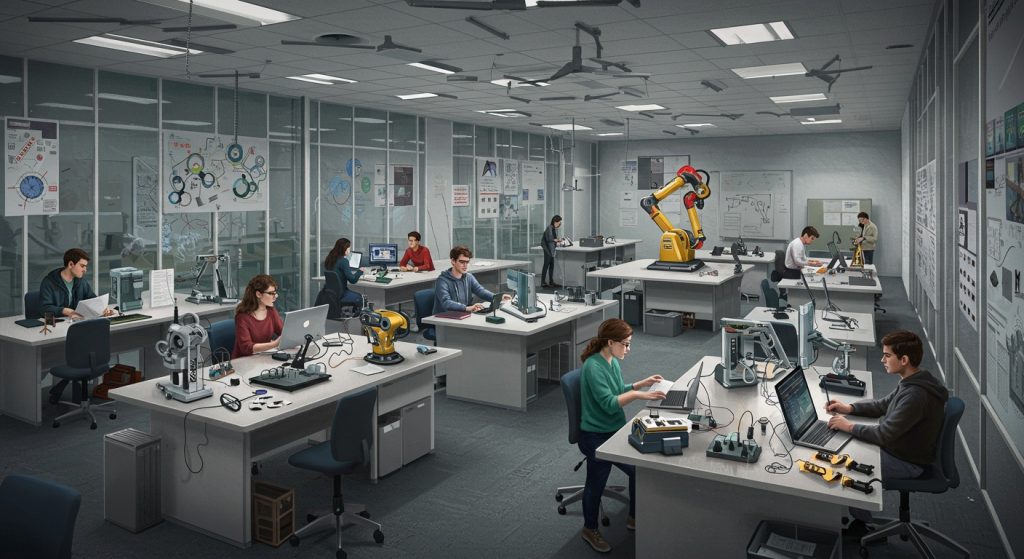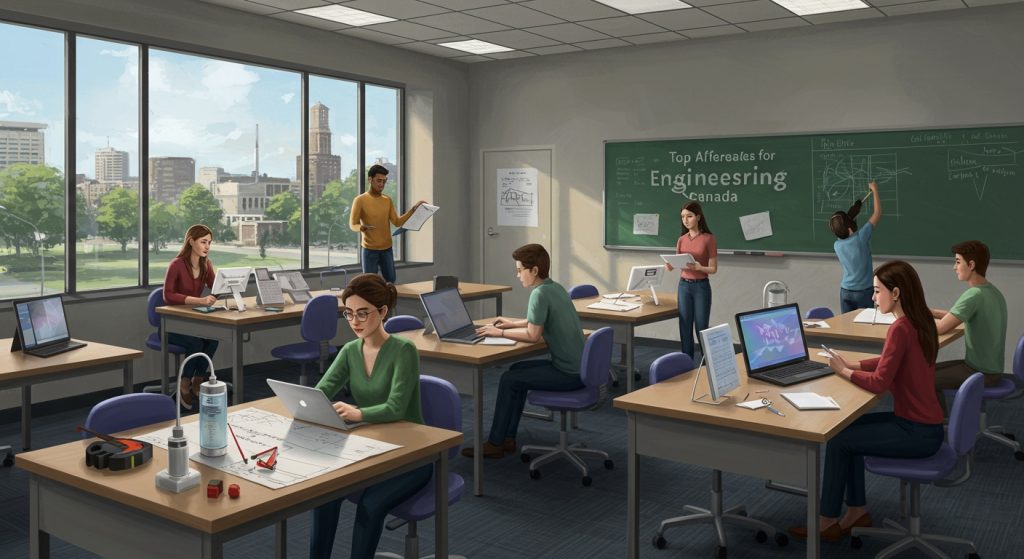The hum of a 3D printer versus the bustle of a university lab – where will you forge your engineering future? As Industry 4. 0 blurs lines, the choice between online and in-person engineering degrees demands careful consideration. Enrollment in online engineering programs has surged by 40% in the last five years, fueled by flexible learning platforms and sophisticated simulation software mirroring real-world applications. Yet, the irreplaceable value of hands-on experience, collaborative projects in physical spaces. Spontaneous faculty interactions remains a potent argument for the traditional route. Discover how ABET accreditation standards are evolving to ensure quality across both modalities. Navigate the crucial decision that aligns with your learning style, career aspirations. The demands of a rapidly changing engineering landscape.

Understanding the Core Differences: In-Person vs. Online Engineering Programs
Choosing the right path for your engineering education is a significant decision. The core difference between in-person and online programs lies in the learning environment and delivery method. In-person programs offer a traditional classroom setting with face-to-face interaction with professors and peers. Online programs, on the other hand, deliver course content through digital platforms, allowing for greater flexibility and self-paced learning.
- In-Person Programs: Characterized by structured schedules, physical labs. Immediate access to instructors. These programs foster a strong sense of community and provide ample opportunities for networking.
- Online Programs: Offer asynchronous learning, meaning you can access lectures and materials at your convenience. They often incorporate virtual labs and simulations to replicate hands-on experiences. Online programs appeal to students who require flexibility due to work, family, or other commitments.
The Curriculum: How Engineering Concepts are Taught
The curriculum in both in-person and online engineering programs aims to cover fundamental engineering principles, specialized topics within your chosen discipline (e. G. , civil, mechanical, electrical engineering). Practical applications. But, the delivery of this curriculum can differ significantly.
In-Person Learning:
- Lectures: Traditional lectures are a primary method, allowing for direct interaction and immediate clarification of doubts.
- Labs: Physical labs are crucial for hands-on experience with equipment and experimentation.
- Group Projects: Collaborative projects foster teamwork and problem-solving skills.
Online Learning:
- Video Lectures: Recorded lectures provide flexibility and allow students to review material at their own pace.
- Virtual Labs: Simulations and virtual environments replicate lab experiences. While not identical to physical labs, they offer a safe and cost-effective way to learn practical skills.
- Online Forums and Discussion Boards: These platforms facilitate interaction with instructors and peers, promoting collaboration and knowledge sharing.
Example: Virtual Labs in Electrical Engineering
Consider an electrical engineering course. In a traditional setting, students might use oscilloscopes, multimeters. Circuit boards in a physical lab. Online, they might use software like Multisim or Tinkercad to simulate circuits, measure voltage and current. Examine waveforms. These simulations allow students to comprehend the fundamental concepts without the need for expensive equipment or physical space.
Flexibility and Time Management: Balancing Life and Studies
One of the most significant advantages of online engineering programs is their flexibility. This is especially appealing to students who have existing commitments, such as a full-time job or family responsibilities. But, this flexibility also requires strong time management skills and self-discipline.
In-Person Programs:
- Structured Schedule: Fixed class times and deadlines provide a clear framework for managing your time.
- Reduced Flexibility: Requires adherence to a set schedule, which can be challenging for students with other commitments.
- Built-in Accountability: Regular attendance and participation in class provide a natural form of accountability.
Online Programs:
- Flexible Schedule: Allows you to study at your own pace and on your own time.
- Increased Responsibility: Requires strong self-discipline and time management skills to stay on track.
- Potential for Procrastination: The asynchronous nature of online learning can lead to procrastination if not managed effectively.
Anecdote: Sarah, a working professional, pursued an online mechanical engineering degree while working full-time. She leveraged the flexibility of the program to study during evenings and weekends, ultimately earning her degree without having to quit her job. This demonstrates the power of online learning for those with busy schedules.
Cost Considerations: Tuition, Fees. Hidden Expenses
The cost of an engineering degree can vary significantly depending on the institution and the program format. While online programs are often perceived as being more affordable, it’s crucial to consider all associated costs, including tuition, fees, technology requirements. Potential lost income.
In-Person Programs:
- Higher Tuition Fees: Generally, in-person programs have higher tuition fees due to the cost of maintaining physical facilities and providing on-campus resources.
- Additional Expenses: Commuting costs, textbooks, lab fees. On-campus housing can add to the overall expense.
- Potential for Scholarships and Grants: Many universities offer scholarships and grants specifically for on-campus students.
Online Programs:
- Lower Tuition Fees: Online programs often have lower tuition fees due to reduced overhead costs.
- Reduced Expenses: Eliminates commuting costs and may reduce textbook expenses through digital resources.
- Technology Requirements: Requires a reliable computer, internet connection. Potentially specialized software.
It’s vital to note that some universities charge the same tuition for both online and in-person programs. Thoroughly research the specific costs associated with each program to make an informed decision.
Accreditation and Recognition: Ensuring the Value of Your Degree
Accreditation is a crucial factor to consider when choosing an engineering program, regardless of whether it’s online or in-person. Accreditation ensures that the program meets specific quality standards and prepares graduates for professional practice. The most recognized accreditation body for engineering programs in the United States is ABET (Accreditation Board for Engineering and Technology).
Importance of ABET Accreditation:
- Industry Recognition: ABET-accredited programs are widely recognized and respected by employers in the engineering field.
- Licensure: Graduation from an ABET-accredited program is often a requirement for obtaining professional engineering (PE) licensure.
- Quality Assurance: Accreditation ensures that the program has met rigorous standards for curriculum, faculty, facilities. Student outcomes.
Verifying Accreditation:
Before enrolling in any engineering program, verify its accreditation status on the ABET website. This will help you ensure that your degree is recognized and valued by employers and licensing boards.
Networking Opportunities: Building Connections for Your Career
Networking is an essential aspect of an engineering education. Building connections with professors, classmates. Industry professionals can open doors to internships, job opportunities. Valuable mentorship. While networking opportunities exist in both in-person and online programs, they may differ in their format and accessibility.
In-Person Programs:
- Face-to-Face Interaction: Provides ample opportunities for spontaneous interactions with professors and classmates.
- On-Campus Events: Career fairs, guest lectures. Student organizations facilitate networking with industry professionals.
- Lab Groups and Study Sessions: Collaborative learning environments foster strong relationships with peers.
Online Programs:
- Virtual Networking Events: Online career fairs, webinars. Virtual conferences provide opportunities to connect with industry professionals.
- Online Forums and Discussion Boards: Facilitate interaction with classmates and instructors, fostering a sense of community.
- Alumni Networks: Many universities offer online alumni networks to connect graduates with potential mentors and job opportunities.
Case Study: Mark, an online civil engineering student, actively participated in online forums and attended virtual networking events organized by his university. Through these interactions, he secured an internship with a leading engineering firm, demonstrating the value of online networking opportunities.
The Role of Hands-On Experience: Labs, Projects. Internships
Hands-on experience is crucial for developing practical skills and applying theoretical knowledge in engineering. Both in-person and online programs strive to provide hands-on learning opportunities through labs, projects. Internships. But, the nature and accessibility of these experiences can differ.
In-Person Programs:
- Physical Labs: Offer direct experience with equipment, instruments. Experimental procedures.
- Group Projects: Collaborative projects allow students to apply their knowledge to real-world problems.
- Internship Opportunities: Universities often have established relationships with local companies, facilitating internship placements.
Online Programs:
- Virtual Labs: Simulations and virtual environments replicate lab experiences, providing a safe and cost-effective way to learn practical skills.
- Remote Labs: Some universities offer remote labs, allowing students to control physical equipment remotely via the internet.
- Internship Support: Universities provide resources and support to help online students find internship opportunities in their local areas.
| Feature | In-Person Programs | Online Programs |
|---|---|---|
| Learning Environment | Traditional classroom setting | Digital platforms, self-paced learning |
| Flexibility | Less flexible, structured schedule | Highly flexible, study at your own pace |
| Cost | Higher tuition fees, additional expenses | Lower tuition fees, reduced expenses |
| Networking | Face-to-face interaction, on-campus events | Virtual networking events, online forums |
| Hands-on Experience | Physical labs, group projects | Virtual labs, remote labs, internship support |
Career Prospects: How Employers View Online Engineering Degrees
The perception of online engineering degrees among employers has evolved significantly in recent years. As online education becomes more prevalent and reputable, many employers now view online degrees as comparable to traditional degrees, provided they are from accredited institutions.
Factors Influencing Employer Perception:
- Accreditation: Graduates from ABET-accredited online programs are generally viewed favorably by employers.
- Reputation of the Institution: Degrees from well-known and respected universities carry more weight, regardless of whether they are earned online or in-person.
- Skills and Experience: Employers prioritize candidates who possess the necessary skills and experience for the job, regardless of how they acquired them.
- Communication Skills: Demonstrating strong communication skills in interviews and cover letters is crucial for online graduates.
Actionable Advice:
- Highlight Relevant Projects: Showcase projects and accomplishments in your resume and portfolio to demonstrate your skills and abilities.
- Emphasize Soft Skills: Highlight your communication, teamwork. Problem-solving skills, which are essential for success in any engineering role.
- Network Actively: Attend industry events, join professional organizations. Connect with potential employers on LinkedIn.
Conclusion
Choosing between an online or in-person engineering degree hinges on your unique circumstances and learning style. Consider your discipline; fields like mechanical engineering often benefit from hands-on lab work, potentially favoring in-person programs. But, advancements in virtual labs are rapidly blurring this line. Think about it: are you disciplined enough to self-regulate your learning in an online environment? My personal tip? Shadow an engineer in your target field. Understanding the day-to-day realities can clarify which learning environment will best prepare you. Reflect on whether you thrive in collaborative spaces or prefer independent study. Look at the university’s infrastructure investments to ensure it matches your requirement. Ultimately, the “right” path is the one that empowers you to build a strong foundation and achieve your career aspirations. Embrace the challenge. Engineer your future!
More Articles
Top Infrastructure Investments Enhancing State University Campuses in India
Future of Learning: Emerging Trends in State University Education India
Data Science: Master’s Or Bachelor’s Degree? Which Path Is Right For You?
Comparing Data Science Curricula: Key Differences Between Top Universities
FAQs
Okay, so what’s the BIG difference, really, between getting an engineering degree online versus in person?
Great question! The core material is usually the same – calculus, physics, the engineering fundamentals. The main difference is how you learn it. In-person offers that direct, face-to-face interaction with professors and classmates, which some people thrive on. Online is more flexible, letting you learn at your own pace and on your own schedule. You need to be super disciplined.
Will employers look at an online engineering degree differently?
That’s a valid concern. Generally, as long as the online program is ABET-accredited (Accreditation Board for Engineering and Technology), employers shouldn’t discriminate. ABET accreditation means the program meets certain quality standards. Check for that ABET seal of approval!
What about the hands-on stuff? Engineering seems pretty hands-on… How does that work online?
You’re right, engineering is definitely hands-on! Online programs handle this in a few ways. Some might require you to purchase lab kits to use at home. Others might have intensive on-campus lab sessions. And some use virtual labs, which are simulations. It’s crucial to comprehend how a specific program addresses the hands-on component before you commit.
I’m working full-time. Is an online degree even realistic?
Absolutely! That’s a huge advantage of online programs. The flexibility allows you to balance work, family. Studies. Just be realistic about the workload. Engineering is tough, regardless of the format. Be prepared to dedicate significant time and effort, even with the flexibility.
What if I’m terrible at self-discipline and need someone breathing down my neck to get things done?
Then an in-person program might be a better fit for you. Online learning requires a high degree of self-motivation and time management. If you know you struggle with that, the structure and accountability of a traditional classroom setting could be a lifesaver.
Besides flexibility, are there other perks to online engineering programs?
Yep! Cost is often a factor. Online programs can sometimes be cheaper due to lower overhead. Plus, you save on commuting costs and potentially housing. Also, you can often find programs offered by universities that are far away, giving you access to specialized programs you might not otherwise have.
So, how do I actually decide? This is overwhelming!
I get it! Start by honestly assessing your learning style, your budget. Your time constraints. Research different programs (ABET accreditation is key!). Talk to current engineering students (both online and in-person) and see what their experiences are like. Don’t rush the decision. It’s a big investment of time and money, so take your time and choose the path that’s truly right for you.



